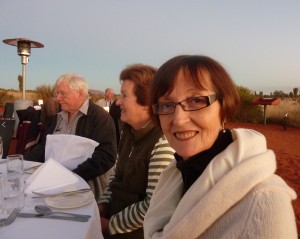No matter how severe her dementia, she’ll “never be an empty shell,” says Christine Bryden
Talking to me now, Christine Bryden says she can’t relate to the person she was before her dementia diagnosis. “It’s like someone I might have once known.”
Christine was 46 years old, an adviser to the Prime Minister on science and technology and responsible for millions of dollars of research programmes when she was diagnosed with dementia and given only a few years to live.

Christine Bryden
And yet, 20 years later, Christine has written four books and is a sought-after speaker about her experiences with dementia. She is exceptionally positive about her condition, though she says it certainly wasn’t always that way. She tells me she can see parallels in her own story with Job’s experience in the Bible.
“I see that as a parable for all of us living with dementia, actually. Job says, ‘Truly the thing that I fear comes upon me and what I dread befalls me.’ That’s definitely how I felt in the beginning. You’re gutted in all directions.”
Christine says she had a “razor-sharp” memory, with space for hundreds of research projects, policy and space-related activities. “Now, I can’t remember yesterday necessarily. It’s like being fractured in splices of memory. Bits and pieces like edited tape on the cutting room floor, and every now and then there is a pool of light cast on some bit of it.”
Doctors don’t seem to be able to attribute Christine’s current condition to anything other than the fact that she was exceptionally bright prior to diagnosis. But Christine says her Christian faith has been her “mainstay”.
She is articulate, though she speaks slowly and deliberately – much slower, she says, than she used to. Words don’t come easily. And yet she still talks like a scientist – exploring a new world within her own mind.
“I feel like an early explorer, setting sail to the edge of the world, not knowing where I’m going … how long will I survive? How long will I be able to talk? What can I tell people about my discoveries? How long can I keep doing that?”
Of course, she doesn’t know the answer to those questions, but through it all she’s come to an understanding that regardless of whether she can continue to speak, or what she forgets, she’s still fully human in the eyes of God.
“When you become a Christian, it’s through a spiritual awakening. It’s not through me reading texts and struggling to understand God. It’s got nothing to do with thinking. It’s a work of God.”
In fact, Christine says in many ways she’s more open in her relationship with God now, with dementia.
“Before, my head was full of stuff. Sometimes now (though not always) I can just relax and be with God. I see that as a real gift.”
Getting through the days requires great effort for Christine. She says she often struggles to remember to speak, to walk, to talk, to understand. “I feel like a pressure cooker about to go off.”
She describes escalators as “moving nightmares” that are difficult to navigate, public bathrooms with their shiny surfaces and mirrors as “really difficult to comprehend”.
“I feel wobbly, and that’s to do with how I see the world. I don’t perceive it fast enough. It’s slow input and interpretation. It’s difficult to see something new properly. I often have to pause and let my brain tell me what it’s seeing before I can process it.”
Every afternoon Christine takes her poodle for the same walk near the lake close to the southern Queensland home she shares with her husband, Paul. It’s a “walking prayer time”, to take away some of the anxieties she’s dealt with throughout the day.
“My prayers are a big muddle, but I’m sure God doesn’t mind. It’s interaction and a thank you now and then. I pray that tomorrow will be better. At night, I try and settle myself with the Lord’s Prayer, but I often forget huge chunks of it.”
Christine says she and Paul are a team, navigating the unknown. With Paul’s help, and faith as her anchor, she has “been able to turn the suffering around – the shock, the horror, the fear, the trauma, which was true for a couple of years – to try and use it for God’s glory and to benefit the church.”
Through her talks and her books, she says she hopes she can encourage families of people with dementia, ministers and pastoral carers to see dementia through a “faith lens”.
“So they realise that no matter how severe the dementia, we are fully human and loved by God. We are embodied souls and endowed with the breath of God. We’re animated by God. Never will I be an empty shell.”
To read our feature article on faith and dementia, click here.
Email This Story
Why not send this to a friend?



